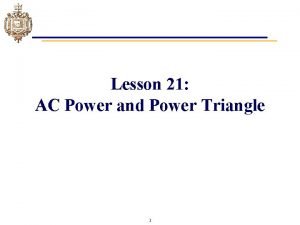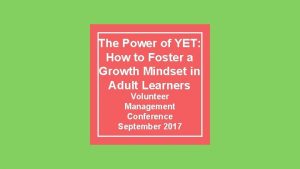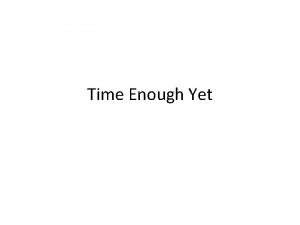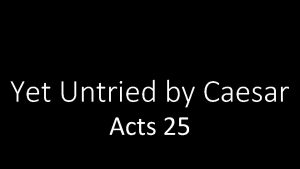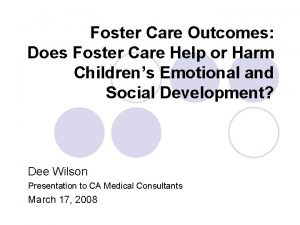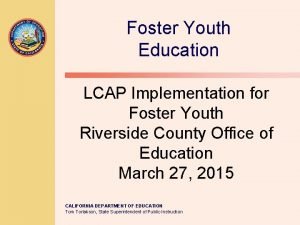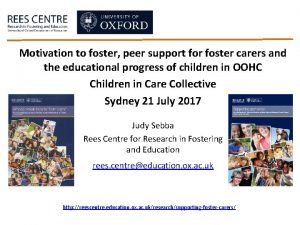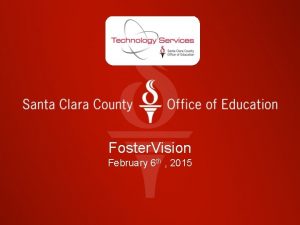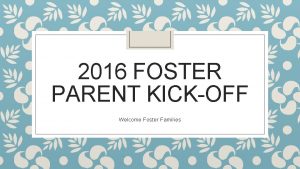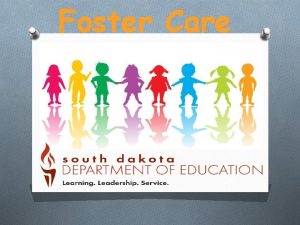The Power of YET How to Foster a







































- Slides: 39

The Power of YET: How to Foster a Growth Mindset in Adult Learners Volunteer Management Conference September 2017

Welcome! Today’s facilitators are. . . Stephanie Sommers ● Minneapolis Adult Education ● ACES Coordinator through ATLAS Theresa Luther-Dolan ● MN Department of Corrections ● Regional Transitions Coordinator

Today’s Objectives Ø Understand how to identify fixed or growth mindsets. Ø Explore characteristics of fixed vs growth mindsets for yourself and for working with learners. Ø Explore classroom activities to develop a growth mindset in learners. Ø Discover tools for fostering a growth mindset

Quick Survey How many of you have … • no previous exposure to mindset research? • some familiarity with this topic? • a great deal of familiarity with it? • a desire to foster your own growth mindset? • a desire to foster a growth mindset in the adults with whom you work?

What’s the difference between these two images?

What Motivates Students to Try Hard in School? We have all observed that some students are highly motivated and others are not. Why?

What Is Mindset? Fixed Mindset Growth Mindset The belief that intelligence is a fixed trait, like eye color The belief that intelligence can be developed, like a muscle

Why Is Mindset Important? There is a large body of research that supports the idea that students with a growth mindset do better in school. This is especially evident in response to a setback or challenge Students with a fixed mindset tend to give up because they believe that they “just don’t get it” or they “just can’t do it. ” They don’t want to ask for help or show a lot of effort because they fear not looking smart. Students with a growth mindset embrace a challenge because they see it as a way to develop and grow. They understand the value of “productive struggle. ”

Mindset Research The leading researcher in the area of mindset is Carol Dweck. She is a professor of psychology at Stanford University.

Growth Mindset and Achievement Decades of research show a powerful relationship between mindset and achievement Students’ beliefs about intelligence and learning impact: beliefs • Motivation • Academic behaviors (e. g. , studying and seeking help) • Responses to challenges and setbacks • Academic achievement Taken from a presentation by the PERTS Center at Stanford University

What do they all have in common?



The Malleable Brain In order for students to begin to develop a growth mindset, they need to first understand that the brain has amazing properties that allow it to change and grow. Neuroscience tells us that working hard within a challenging environment causes new connections to develop in the brain, and these connections impact our intelligence. “For students to have a growth mindset, they should understand that trying harder - and trying new strategies - not only helps them succeed at the current task but also helps them succeed in the future by strengthening their brain. ” -mindsetkit. org

Neuroplasticity - https: //youtu. be/ELpf. YCZa 87 g Part of the Sentis Brain Animation Series

Recursive Processes Taken from a presentation by the PERTS Center at Stanford University Growth Mindset Increased Effort Higher Achievement Challenge or Failure Fixed Mindset Reduced Effort Lower Achievement

Mindsets Can Change! Rigorous research also shows that mindsets can change When they are changed to have a Growth Mindset, students do better

Developing a Growth Mindset ● Praise the process over the product ● Encourage active reflection on learning ● Set goals & monitor progress

How Do Everyday Interactions Shape Mindsets? • The language we use tells others what language we believe and what we value • Feedback tells us what is expected of Feedback us and what goals we should have Taken from a presentation by the PERTS Center at Stanford University

1. Praise

3 Ways to Celebrate Mistakes in Class Ø Start classes with the norm that you love and want mistakes Review the list of phrases Ø Don’t just praise mistakes – explain why they are important Which ones celebrate mistakes and encourage growth-mindset? Ø Give work that encourages mistakes

Your Turn & talk to a partner about the phrases that you did not check. In your opinion, why do they not celebrate a growth mindset? How could you re-cast these phrases so that they better represent a growth mindset?

Do Focus On: Efforts and strategies used: Growth Mindset Praise Don’t Focus On: Qualities commonly interpreted as fixed, like talent or intelligence Taken from a presentation by the PERTS Center at Stanford University “I like how you tried a new way to solve that. ” Abilities improving over time with practice: “You’ve been practicing and I can see it’s paying off. ” Mistakes and being challenged as necessary part of learning: “I love mistakes because they’re an opportunity to learn - being challenged is when the brain grows most. ”

Effective Effort Rubric

“I can’t change the direction of the wind, but I can adjust my sails to always reach my destination. ” --- Jimmy Dean (American singer, actor and businessman)

2. Active Reflection

Active Reflection Read the reflection prompt and take a few moments to write down your response. If you feel comfortable doing so, share your response with a partner. Think about a time when you have struggled with directions when trying to navigate a new place. What did you learn abou the experience? How did it change your behavior?

Active Reflection Journal Prompts to Encourage a Growth Mindset o Write about one of the biggest mistakes you’ve ever made. What important lessons did you learn from that mistake? How did making that mistake help improve who you are today. o Write about a time when you struggled to accomplish or finish something. What did you learn from the experience? o Would you rather solve an easy math problem or one that is more difficult? Why? o Would you rather write your own opinion essay or copy the teacher’s writing?

Active Reflection Write a letter to a future student or to your future self Growth Mindset Lesson Plan developed by Khan Academy and PERTS https: //www. mindsetkit. org/top ics/teaching-growthmindset/growth-mindsetlesson-plan

“Remember no one can make you feel inferior without your consent. ” --- Eleanor Roosevelt (American First Lady and humanitarian) “Nothing will work unless you do. ” --- Maya Angelou (American poet)

3. Setting Goals & Monitoring Progress

A Growth Mindset Student Conferencing Form

Goal Setting Journal Writing and Personal Timeline • Journal Writing Prompt: What is your plan? • Students draw their own Life-line/Timeline from the past and what they feel will be their future on the “line”. Teacher reflects with student on commonalities and differences among the significant events/influences that occur in the life-line (e. g family members, chance events).

Goal Setting Skills Identification and S. M. A. R. T. Goals • Skills Exercise: Students circle all the skills they have on the “Skills Identification Sheet”. • Teacher introduces SMART goals. Using skills identification, career interests (prior activity), students develop preliminary SMART goals towards completing the development of their Future Pathway Plan.

“Whatever the mind of man conceive and believe, it can achieve. ” --- Napoleon Hill (American self-help author)

Turn & Talk


What kind of educator/mentor are you? Look back at the selfassessment that you took at the beginning of our session. After learning more your brain and mindset research, are there any answers that you would change? Ø How do you develop a growth mindset in your students? Ø How do you develop a growth mindset in yourself and with your colleagues? Ø What tools do you have/use to encourage GROWTH MINDSET?

Final thought The Neuron Song “Every student can learn. Just not on the same day or in the same way. ” --- George Evans
 Real power and reactive power
Real power and reactive power Các châu lục và đại dương trên thế giới
Các châu lục và đại dương trên thế giới Dot
Dot điện thế nghỉ
điện thế nghỉ Bổ thể
Bổ thể Biện pháp chống mỏi cơ
Biện pháp chống mỏi cơ Phản ứng thế ankan
Phản ứng thế ankan Làm thế nào để 102-1=99
Làm thế nào để 102-1=99 Thiếu nhi thế giới liên hoan
Thiếu nhi thế giới liên hoan Fecboak
Fecboak Chúa yêu trần thế alleluia
Chúa yêu trần thế alleluia Một số thể thơ truyền thống
Một số thể thơ truyền thống Hệ hô hấp
Hệ hô hấp Công của trọng lực
Công của trọng lực Số nguyên là gì
Số nguyên là gì đặc điểm cơ thể của người tối cổ
đặc điểm cơ thể của người tối cổ Tỉ lệ cơ thể trẻ em
Tỉ lệ cơ thể trẻ em Các châu lục và đại dương trên thế giới
Các châu lục và đại dương trên thế giới ưu thế lai là gì
ưu thế lai là gì Tư thế ngồi viết
Tư thế ngồi viết Thẻ vin
Thẻ vin Môn thể thao bắt đầu bằng chữ đua
Môn thể thao bắt đầu bằng chữ đua Hát kết hợp bộ gõ cơ thể
Hát kết hợp bộ gõ cơ thể Cái miệng xinh xinh thế chỉ nói điều hay thôi
Cái miệng xinh xinh thế chỉ nói điều hay thôi Từ ngữ thể hiện lòng nhân hậu
Từ ngữ thể hiện lòng nhân hậu Trời xanh đây là của chúng ta thể thơ
Trời xanh đây là của chúng ta thể thơ Tư thế ngồi viết
Tư thế ngồi viết V. c c
V. c c Gấu đi như thế nào
Gấu đi như thế nào Thơ thất ngôn tứ tuyệt đường luật
Thơ thất ngôn tứ tuyệt đường luật Khi nào hổ con có thể sống độc lập
Khi nào hổ con có thể sống độc lập Thế nào là hệ số cao nhất
Thế nào là hệ số cao nhất Diễn thế sinh thái là
Diễn thế sinh thái là đại từ thay thế
đại từ thay thế Vẽ hình chiếu vuông góc của vật thể sau
Vẽ hình chiếu vuông góc của vật thể sau Thế nào là mạng điện lắp đặt kiểu nổi
Thế nào là mạng điện lắp đặt kiểu nổi Mật thư tọa độ 5x5
Mật thư tọa độ 5x5 Lời thề hippocrates
Lời thề hippocrates Vẽ hình chiếu đứng bằng cạnh của vật thể
Vẽ hình chiếu đứng bằng cạnh của vật thể
